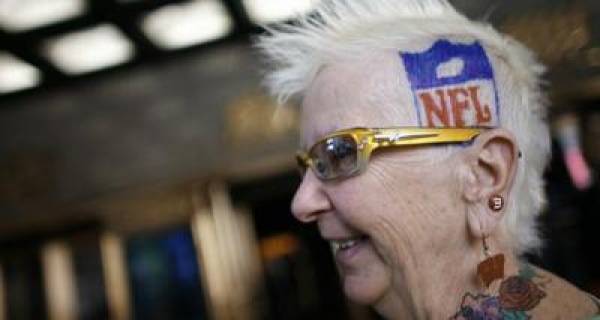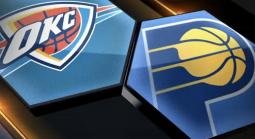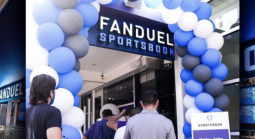NFL Doesn't Want Your Bets

The Wall Street Journal, page D16
By HANNAH KARP
Some of the National Football League's founders were gamblers. The league draws more wagers in the U.S. than any other sport. It recently authorized its teams to sell their logos to state lotteries. But when it comes letting states expand sports betting, the NFL has made its position clear: Not now, not ever.
The NFL, which says it will earn $8 billion in revenue this year, is threatening to file a lawsuit against the state of Delaware, where the supreme court unanimously concluded last month that parlays -- bets on the outcome of two or more events -- are constitutional, opening the door, as early as this fall, for the state to host what would be the first legal sports books outside of Nevada.
Experts on gambling say the decision could have a domino effect. Last month, New Jersey Gov. Jon Corzine threw his weight behind a federal lawsuit that could pave the way for legalized sports betting in Atlantic City and a spokesman for Pennsylvania Gov. Edward Rendell says he's following the suit with "keen interest."
Delaware Gov. Jack Markell, who announced the plan in March, says the games could bring in as much as $55 million in tax revenue and would help cover the state's projected $800-million budget shortfall for the fiscal year that begins July 1. The governor says he has received several letters from NFL Commissioner Roger Goodell as well as a surprise visit from an NFL representative, who met him in a hallway at the capitol last month and, he says, "urged me not to go forward with this."
The league is considering filing a lawsuit, depending on which types of sports betting Delaware decides to offer.
Concerns Over Integrity
"If sports betting becomes more prevalent through state-promoted schemes, it will inevitably lead those gambling fans to question whether an erroneous officiating call or a dropped pass late in the game resulted from an honest mistake or an intentional act by a corrupt player or referee," says NFL spokesman Joe Browne.
The NFL says its surveys show that "a very small percentage" of the more than 100 million people who watch the NFL on TV bet on the games -- but there is no question that the NFL is the nation's most popular gambling sport. Bettors wagered $81.5 million in Nevada's sports books on this year's Super Bowl -- a sum that's approached $100 million in previous years, according to the Nevada Gaming Commission. A total of $1.1 billion was wagered on football, both college and pro, in Nevada over the 12 months ending in April 30 (not including parlay bets), nearly three times the amount wagered on basketball. Analysts estimate that tens of billions more are wagered on the NFL at offshore casinos. (Internet betting is illegal in the U.S., although individual bettors are rarely prosecuted.)
The NFL's relationship with gambling is a long one. Its founding fathers included Tim Mara, a legal bookmaker from New York whose grandson, John, is a current owner of the New York Giants; Art Rooney, who bought the Pittsburgh Steelers with his gambling winnings and whose family still owns racetracks; and William Barron Hilton, who led Hilton Hotels Corp. into the gambling business several years after selling his controlling interest in the San Diego Chargers in 1966. (The Las Vegas Hilton is now home to the country's largest sports book.)
At a time when states are facing major revenue shortfalls and slashing budgets for things like education, parks and public safety, some fans and state officials say the league's staunch stance against the proliferation of sports betting is unfair, especially in light of public funding that benefits the NFL's franchises. In the past two decades, according to John Vrooman, professor of sports economics at Vanderbilt University, the NFL has taken in nearly $17 billion in taxpayer subsidies to build new stadiums.
"Any time the NFL wants to stand up and dictate to public bodies how they can make money or where they can make money, they have very little standing to do so...especially when it comes to gambling," says Todd Portune, a commissioner in Ohio's Hamilton County. Mr. Portune spearheaded an unsuccessful county lawsuit against the Bengals in 2004 that alleged the NFL used its monopoly power to "extort" money for a new stadium. Taxpayers spent about $450 million on a new stadium for the Cincinnati Bengals and continue to pay an additional $11 million each year in lease-related expenses, he says. Bengals spokesman Jack Brennan says a significant portion of that total was spent on land acquisition to build the stadium in an area that the county, not the team, had wanted.
Responding to the use of taxpayer money for public projects, Mr. Browne says, "The NFL respects the right of public entities to raise funds by appropriate means. We object, however, when they seek to do so by using our assets without permission or regard for the negative impact on our games."
"We are not oblivious to the budget problems of local and state governments," Mr. Browne of the NFL said. "We are willing to assist as long as those states recognize our legitimate interest in not having our players, referees and games used as gambling vehicles."
The NFL's concerns about betting began to grow as early as the 1940s, when two star players on the New York Giants were offered a bribe to fix the 1946 NFL Championship Game and one of the players, Merle Hapes, was suspended for a year. In 1963, Commissioner Pete Rozelle suspended two more players -- Paul Hornung and Alex Karras -- for betting on NFL games.
The league has already sued Delaware once -- and lost -- when the state launched a sports lottery 20 years ago. Delaware is one of only four states, including Oregon, Montana and Nevada, exempted from a 1992 federal ban on sports betting, because they already allowed betting before the ban was implemented.
More recent attempts by the NFL to distance itself from gambling have included banning TV networks from picking a winner against a point spread during pre-game telecasts and spiking an ad for the Wynn Las Vegas from airing during the 2005 Super Bowl.
The NFL says it has managed to preserve football's integrity despite its popularity with bettors in Las Vegas. It employs security representatives to monitor gambling trends on its games and instituted both educational programs and prohibitions on gambling for league and team employees. When the NFL holds its one annual, regular-season match-up at London's Wembley Stadium, it closes the betting windows usually open on site, though bookmakers still take bets across the street.
Betting in the U.K.
Supporters of expanded sports betting say the NFL overstates the dangers. Ladbrokes estimates that 1.25 billion GBP ($2.05 billion) was legally wagered in the U.K. last year on matches in English soccer's Premier League, nearly double the amount wagered on the NFL in Nevada last year. David Forrest, an economics professor at the Centre for the Study of Gambling at University of Salford, estimates that more than half a billion dollars total are wagered each weekend on the Premier League worldwide.
Critics also say the NFL's position is inconsistent. The league recently decided to allow teams to sell their logos to other state lotteries for games that do not involve the outcome of football games. The logo of the New England Patriots, who were the first to sign a deal, will appear on Massachusetts scratch-off lottery tickets this summer.
Meanwhile, an NFL spokesman told reporters the league did not approve of a fantasy NFL-themed sports lottery in Montana, where lottery players select a lineup of NFL players by their city and jersey number. The game generated $87,500 last football season and is expected to bring in double that this year.
Eric Stern, senior counselor to Montana's governor, says, "It's really just getting off the ground, but we are optimistic it could generate significant revenue."
Mr. Browne, the NFL spokesman, says there is a significant difference between scratch-off lottery tickets and bets on the outcomes of games. "We don't believe that more gambling on our players and games is healthy for the sport.... State education funds and other worthwhile projects that receive the lion's share of the revenue will benefit from the sale of the tickets as will our clubs."
"It's pure greed," says New Jersey State Sen. Raymond Lesniak. "They're only fighting it because they're not getting a piece of the action."
Robert McNair, who owns the Houston Texans and sold his horse-breeding farm and training center to Dubai ruler Sheik Mohammed in September, says the league's efforts to stop gambling's spread at this point may be futile.
"There's always been a very high sense of duty to protect the integrity of the game, but I think society has softened its moral concerns about gambling, by virtue of the proliferation of it," says Mr. McNair. "The horse is out of the barn on that one."













